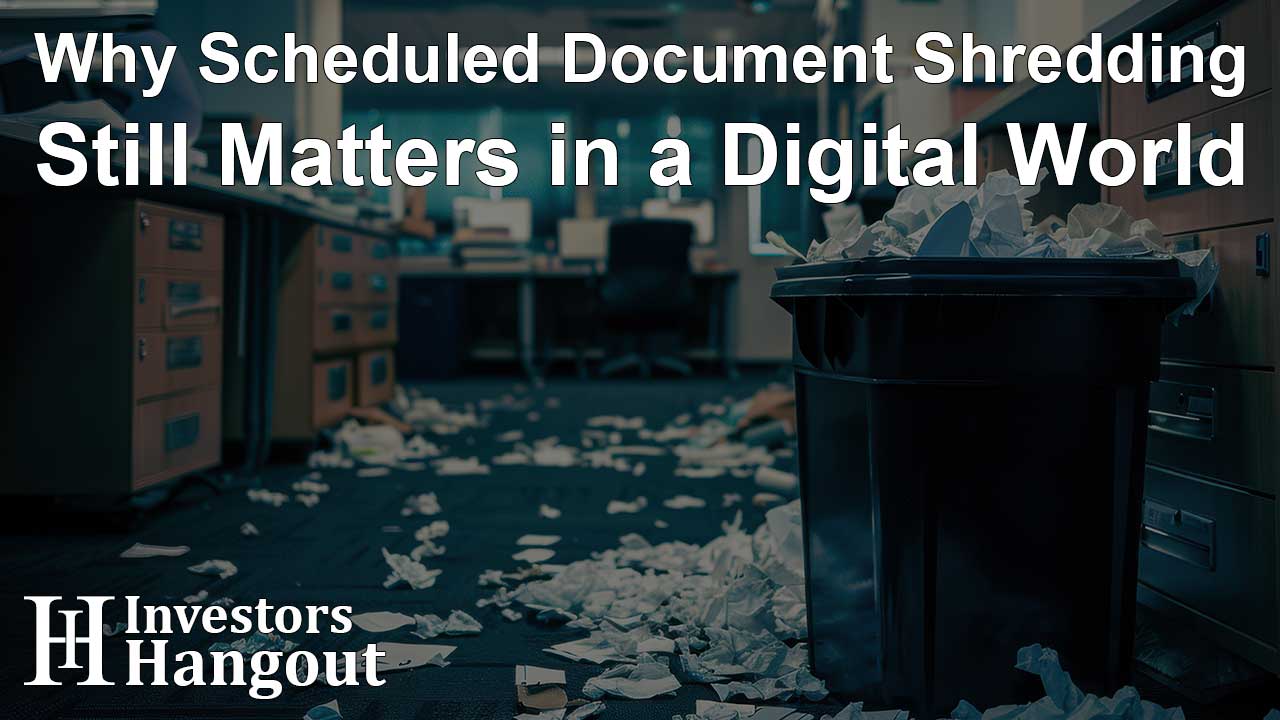Why Scheduled Document Shredding Still Matters in a Digital World

People today trust their digital security because they use firewalls together with password managers and encrypted messaging systems. Online data protection has become standard practice, but people tend to forget about the physical documents stacked up at their desks, in their drawers, and in trash cans.
The physical documents represent a significant threat, which most people tend to forget about. Old tax returns, alongside credit card statements and printed medical records, appear harmless. Yet, their incorrect use by others results in identity theft, fraud, and legal complications. People tend to ignore basic physical data security measures, even though they spend increasing amounts of time thinking about digital risks.
The solution is regular document shredding services. Regular shredding needs to happen at predetermined times rather than sporadically.
The Hidden Risk of Paper Documents
Paper remains an essential part of daily life despite the rise of digital technology. Consider the last printed receipt containing personal details or a delivery package displaying your complete address. The production of client records, together with invoices and internal memos at businesses, creates substantial amounts of paperwork, which frequently holds confidential information.
The physical documents lack the digital file protection measures that most people take for granted. The documents get discarded into recycling bins or filing cabinets, where they remain ignored. Dumpster diving exists as a genuine strategy that identity thieves use to find stolen information. Documents that leave your control can quickly find themselves in improper possession.
The failure to manage physical data allows cybercriminals to circumvent all your cybersecurity precautions.
What Is Scheduled Document Shredding?
The approach describes the process of scheduled paper document destruction. You should establish fixed shredding sessions with regular frequencies, including daily, weekly, monthly, or quarterly, to eliminate sensitive papers. The document shredding process for businesses requires working with professional services that perform scheduled collections followed by the destruction of documents.
The procedure stops documents from accumulating while eliminating uncertainty about their status. The process joins your information protection routine in the same manner as software updates and password changes.
Who Needs Scheduled Shredding the Most?
The short answer: almost everyone.
Freelancers and small business owners regularly use printed documents to create invoices and contracts. Business operations that involve paper documents, such as forms, receipts, and customer files, are common in small business operations. Bank statements, together with school records, represent typical documents that contain sufficient personal information to be classified as risky.
Medical offices, together with legal practices and financial institutions, already need to follow strict disposal protocols. Every person who wants to protect their privacy should adopt scheduled document shredding as a simple method to decrease exposure.
The protection of your data becomes essential because a single mistake in security can lead to its exposure.
How Scheduled Shredding Supports a Complete Security Plan
The best approach to data protection requires complete coverage of all possible areas. Even the most powerful password provides no protection when printed documents remain accessible to others.
Scheduled shredding closes that gap. The physical security measures provide digital protection through their implementation. The process helps organizations fulfill their legal requirements to properly dispose of customer information according to privacy standards and industry regulations.
The practice develops into an essential security approach that benefits shared areas where papers remain accessible to others.
Tips for Starting a Shredding Schedule
The process of starting becomes more manageable than people typically anticipate. Create separate categories of documents into three groups, which should include items to keep, things to shred, and materials for recycling. Documents that contain names, addresses, account numbers, or signatures should go to the shredding pile.
Select the proper frequency to review your documents. A monthly document review works best for most people. Designate a specific container for shredding materials, which you should dispose of when your shredding schedule arrives.
People who need large-scale shredding of important documents should consider hiring professional shredding services that provide pickup and drop-off services for secure document disposal.
The key is consistency. The practice of shredding papers as part of your ordinary schedule makes it simple to stay ahead of potential security risks.
Conclusion
Digital threats receive widespread attention, but physical documentation remains a real factor. A single lost document reveals more sensitive information than people might anticipate.
Scheduling document shredding as a part of your routine security practices provides effective data protection across all spectrums of your data. Staying smart requires the same level of consideration as paranoia does. Protecting all types of information remains important because information holds value in every aspect of our world.
About The Author
Contact Thomas Cooper privately here. Or send an email with ATTN: Thomas Cooper as the subject to contact@investorshangout.com.
About Investors Hangout
Investors Hangout is a leading online stock forum for financial discussion and learning, offering a wide range of free tools and resources. It draws in traders of all levels, who exchange market knowledge, investigate trading tactics, and keep an eye on industry developments in real time. Featuring financial articles, stock message boards, quotes, charts, company profiles, and live news updates. Through cooperative learning and a wealth of informational resources, it helps users from novices creating their first portfolios to experts honing their techniques. Join Investors Hangout today: https://investorshangout.com/
